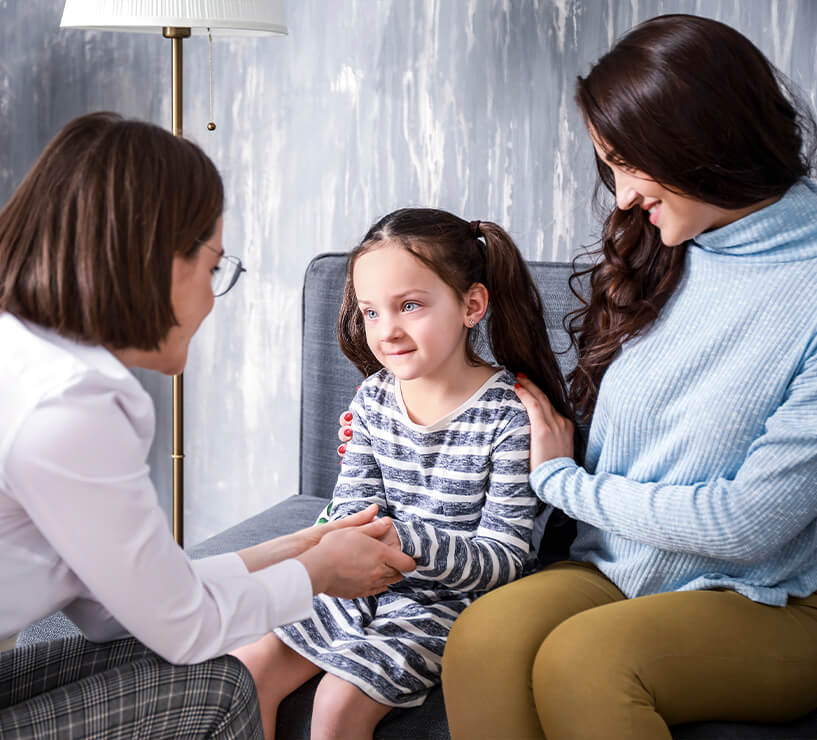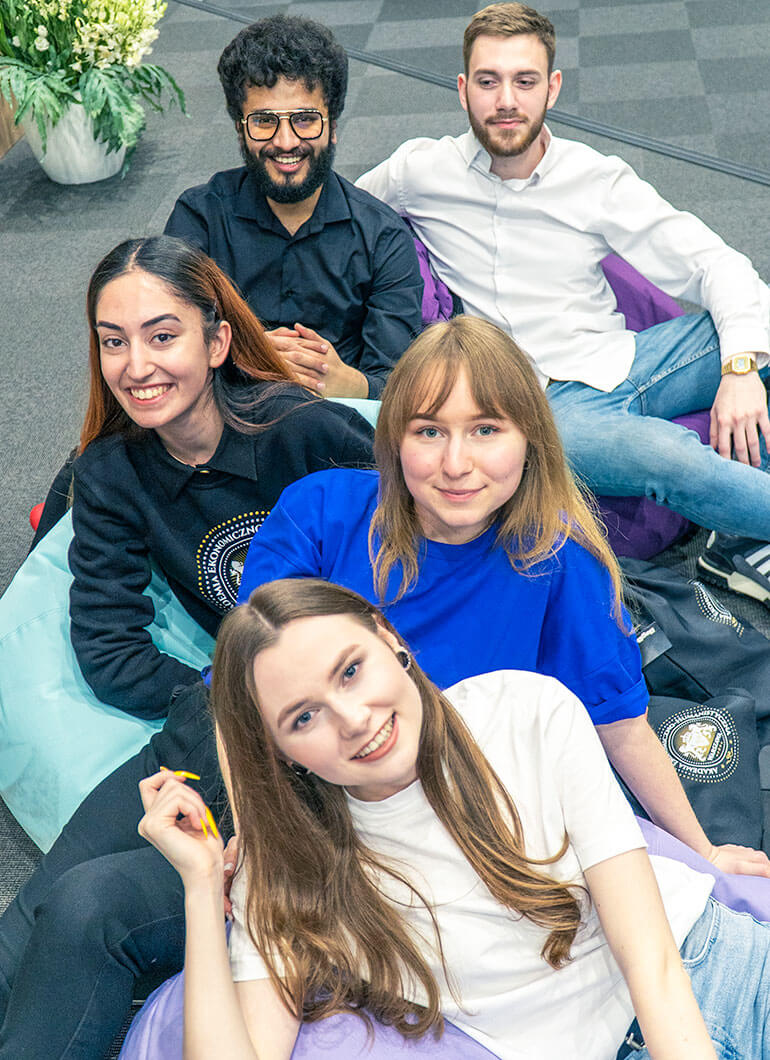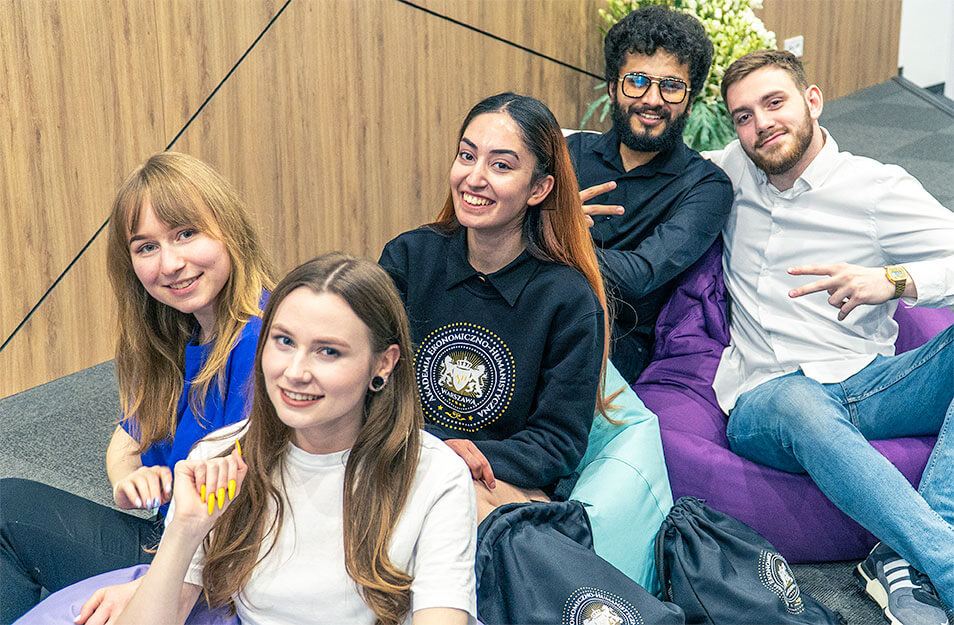Family Studies
Undergraduate (Bachelor)
Family Studies
Why choose this field of study?
Family studies are primarily an option for people with special social sensitivity who want to use knowledge of psychology and related sciences to provide help and support to families in need. This is a unique program devoted to the family as a subject of study in psychology and other social sciences. By choosing this field of study you will become familiar with complex methods of diagnosis and work with families. You will learn how to provide effective support by tailoring it to the specific problems of families.
In the curriculum, the student has a choice of one of two extension modules: Family Assistant or Family Foster Care Coordinator. The courses planned as part of these modules allow the program to be comprehensively adapted to the expectations of students. Regardless of the nature of the problems of the assisted family, you will be able to steer it on the right path. By graduating, you will be ready to become a counselor, educator and therapist who uses their knowledge to teach others to solve problems on their own.
What sets us apart:
- We offer practical courses that directly prepare towards professional activity.
- We place special emphasis on psychological preparation and scientific psychological knowledge as a foundation for your future work in various professions providing services to the family.
- Our staff consists of experienced psychologists and other professionals who are professionally involved in family counseling and family issues.
- The University of Economics and Human Sciences in Warsaw can be described as a cultural heart of Warsaw. We are the leader among universities in the “Internationalization” category according to the Perspektywy University Ranking.
- We believe that writing an undergraduate thesis involves too much time, nerves, paper, and ink. For this reason, instead of writing a tedious bachelor’s thesis, you will implement your own innovative social project to benefit the local community of your choice.
- We focus on modernity and flexibility, and enable online study for those who study better at home.
What can you do after graduation?

As a family studies graduate, you can work in numerous social welfare institutions or choose the private consulting sector. You can find employment in day care centers, foster care centers, adoption centers, or state control bodies of social welfare units, among others. The position of family assistant in social welfare centers or social service centers will also be open to you. You can find employment with family support NGOs or start one yourself.
This program
is for you if:
You are highly empathetic and are not indifferent to the fate of others.
You believe in the sense of grassroots work and want to make a difference in society by helping those who need it.
You are interested in psychology and want to use it in your future work for families.



New requirements for visa applications
Note: important information for bachelor’s degree candidates (first-cycle studies)
In line with the new requirements for visa applications introduced by Polish consulates around the world, candidates applying for a student visa are now required to submit a document confirming their eligibility to apply for a bachelor’s degree (first-cycle studies), issued by the Polish Education Superintendent Office (in Polish – Kuratorium Oświaty). Previously, this document could be provided after arrival in Poland, but under the new regulations, it must be submitted along with the visa application. The procedure for master’s degree candidates remains unchanged.
While the new requirement may slightly extend the visa process, the UEHS is fully prepared to support bachelor’s degree candidates throughout this period. To ensure there are no disruptions to their education, candidates who cannot arrive in Poland before the start of classes will be able to participate in lectures online via MS Teams.
We also have developed a range of effective solutions to provide comprehensive assistance in obtaining the required documents. Our support includes:
- preparing the necessary paperwork
- certified translations into Polish
- submitting the application to the Education Superintendent Office
- promptly ensuring the recognized diploma is sent back to the candidate’s home country.
Would you like more information and support? READ MORE
Programme and structure of studies
Undergraduate
(bachelor’s degree)
The family studies curriculum is based on the belief that professional psychological support is paramount in family care. As part of the course of study, the student acquires comprehensive knowledge and skills in psychology, including, among others, the psychology of family and close relationships, personality psychology, psychopathology, or the basics of psychological assistance. The curriculum also includes classes in family law, methodology of working with families, or family pedagogy. In the second year, students choose the extension module Family Assistant or Family Foster Care Coordinator.
FIRST YEAR OF STUDY
The first semester of study focuses on classes designed to give students a broad knowledge of the social sciences. Beginning in the second semester of study, directional classes begin to prepare the student to work with families. During this semester, students will learn about methods and tools of environmental and family diagnosis, as well as the basics of educational psychology.
| Subject name | Cummulative amount of ECTS points | Cummulative amount of hours (FT/PT) |
| OHS | 0 | 8/8 |
| Academic Skills | 2 | 15/8 |
| Introduction to philosophy | 4 | 30/16 |
| Fundamentals of social communication | 4 | 30/16 |
| Introduction to the state and law studies | 5 | 30/24 |
| Introduction to psychology | 5 | 30/24 |
| Fundamentals of Economics | 5 | 30/24 |
| Anthropology | 5 | 30/16 |
| Subject name | Cummulative amount of ECTS points | Cummulative amount of hours (FT/PT) |
| Foreign language | 2 | 30/16 |
| Sports and recreational activities | 0 | 30/- |
| Basics of environmental and family diagnosis | 4 | 60/32 |
| Psychology of family and close relationships (I) | 5 | 54/32 |
| Quantitative methods – statistics | 6 | 60/40 |
| Sociology of the family and close relationships | 3 | 30/16 |
| Educational psychology | 5 | 30/24 |
| Biological basis of behavior | 3 | 30/24 |
| Electives | 2 | 24/12 |
In the second semester of study, the student chooses 1 from a pool of 2 elective subjects. The student chooses between: Interpersonal training or Intrapsychic training. The number of enrolled students determines the start of the implementation of a particular module.
SECOND YEAR OF STUDY
From the second year of study, dedicated courses begin for the Family Assistant or Family Foster Care Coordinator module chosen by the student. In addition to classes in psychology, law and finance, the program includes classes in family pedagogy and problems of dysfunctional and pathological families.
| Subject name | Cummulative amount of ECTS points | Cummulative amount of hours (FT/PT) |
| Foreign language | 2 | 30/16 |
| Sports and recreational activities | 0 | 30/- |
| Psychology of family and close relationships (II) | 5 | 54/32 |
| Family and guardianship law | 3 | 30/16 |
| Methodology of working with families | 3 | 54/28 |
| Concepts of family and methodology of family research | 2 | 30/16 |
| Psychology of personality | 5 | 30/24 |
| Social psychology | 5 | 54/40 |
| Human development psychology | 5 | 30/24 |
| Subject name | Cummulative amount of ECTS points | Cummulative amount of hours (FT/PT) |
| Foreign language | 2 | 30/16 |
| Psychometrics | 5 | 54/40 |
| Basics of sex education for children and adolescents | 3 | 30/16 |
| Household finances | 3 | 30/16 |
| Non-violent communication | 3 | 30/16 |
| Crisis intervention | 5 | 60/32 |
| Extension module classes | 9 | 120/64 |
In the fourth semester of study, the student chooses one of two extension modules. The modules include the following courses:
- Family assistant – Family pedagogy and Problems of dysfunctional and pathological family
- Family foster care coordinator – Fundamentals of foster care and Contemporary addictions of children and adolescents
The number of enrolled students determines the start of the implementation of a particular module.
THIRD YEAR OF STUDY
As part of the final year of study, students continue to take directional classes and classes specific to previously selected extension modules. From the fifth semester of study, students also begin working on their own community project, which in undergraduate studies replaces the obligation to write an undergraduate thesis.
| Subject name | Cummulative amount of ECTS points | Cummulative amount of hours (FT/PT) |
| Foreign language | 3 | 30/16 |
| Psychopathology | 5 | 30/24 |
| Biology of procreation and family planning | 3 | 45/24 |
| Extension module classes | 3 | 45/24 |
| Internship 14 PR | 14 | 360/360 |
| Social project | 2 | 30/16 |
| Subject name | Cummulative amount of ECTS points | Cummulative amount of hours (FT/PT) |
| Extension module classes | 3 | 30/16 |
| Institutions and organizations supporting the family | 4 | 75/40 |
| Basics of psychological assistance | 5 | 30/24 |
| Internship | 14 | 360/360 |
| Social project and preparation for the diploma exam | 4 | 60/32 |
In accordance with the previous choice of the extension module, students complete the following courses:
- Family assistant – Workshop on working with families and Basics of caring for the elderly and sick;
- Family foster care coordinator – Workshop on working with foster families and Assistance in empowerment of adult foster care alumni.
The number of enrolled students determines the start of the implementation of a particular module.
Tuition fees
Fixed tuition - flexible payments
By choosing to study at UEHS, you can be sure that the tuition fee will not change throughout the duration of your studies. You can pay the tuition fee once for the entire year of study or spread over a semester payment. This allows you to decide how you want to plan your expenses.

Fees (academic year 2024/2025)
| Year of study | Annually | Per semester* |
| I | 2500 € | 1400 € |
| II | 2500 € | 1400 € |
| III | 2500 € | 1400 € |
*Semester payment is possible from the second year of studies.
| Year of study | Annually | Per semester* |
| I | 3500 € | 1900 € |
| II | 3500 € | 1900 € |
| III | 3500 € | 1900 € |
*Semester payment is possible from the second year of studies.
EU and other countries group
This group includes citizens of the countries member states of the European Union and the following countries citizens: Azerbaijan, Belarus, Bosnia and Herzegovina, Montenegro, Georgia, Kazakhstan, Kosovo, Kyrgyzstan, Latin America, Macedonia, Moldova, Russia, Serbia, Tajikistan, Turkey, Turkmenistan, Ukraine, Uzbekistan.
Other countries
The citizens of all the remaining countries.
Study in Polish!
Do you want to study at UEHS in Polish? It is possible! We have prepared a special program for international students to acquire the skills necessary for active study in Polish and for academic, social and everyday life in Poland.
The Comprehensive Polish Language Program for International Students is:
- part of The UEHS Foundation Program, which is a comprehensive preparation for starting regular Bachelor's or Master's studies in Polish at UEHS
- a course aimed at two groups of international students: students with knowledge of a Slavic language (Russian, Ukrainian, Czech etc.) and students without prior knowledge of any Slavic language
- a chance for immersion in Polish society and culture, authentic experience of life in Poland and broad career prospects on the Polish labour market
More details coming soon!
Scholarships - easier than you think

While studying at UEHS, you can take advantage of a wide range of financial support from the state budget and European funds, as well as benefit from special discounts with UEHS discount program
You can submit most scholarship applications quickly and easily through your online account.
In the academic year 2023/2024, the University of Economics and Humanities in Warsaw awarded 800 Rector’s Scholarships, ranging from PLN 400 /month to PLN 1000 /month, depending on the average or achievements. For outstanding sport, artistic or scientific achievements, the Scholarship Committee awarded scholarships of PLN 600 /month.
Detailed information on the possibility of applying for the Rector’s Scholarship is available in the “MojeAEH” system.
A sports scholarship may be awarded to a student who excels in sport achievements at least national level. In addition we also encourage our students to take part in additional support programs- eg. the National Academic Representation.
Young sportsmen can count on financial support in the amount of PLN 600 /month.
Detailed information on the possibility of applying for sports scholarship is available in the “MojeAEH” system.
A scholarship for people with disabilities may be awarded to a student who has a disability certificate, a disability degree certificate, a ZUS certifying physician’s certificate, a disability group certificate or a certificate of permanent or long-term incapacity to work on a farm.
In the 2023/2024 academic year, depending on the degree of disability, 350 scholarships for people with disabilities were awarded, ranging from PLN 1700 /month to PLN 1900 /month.
Detailed information on the possibility of applying for a scholarship for people with disabilities is available in the “MojeAEH” system.
The allowance is a form of emergency financial assistance. Any student who found himself temporarily in a difficult life situation resulting from random events beyond the student’s control can apply for it.The allowance may be granted twice in one academic year, and the allowance is not granted twice for the same random event.
In 2024, we granted 51 allowances for a total of PLN 255 000. The allowances, depending on the student’s situation, were paid in the amount of PLN 2,000 to PLN 5,000 at a time.
Detailed information on the possibility of applying for the allowance is available in the “MojeAEH” system.
2023/2024 academic year
800 Rector’s Scholarships
51 allowances
350 scholarships for people with disabilities
12 500 000 PLN was spent in 2023/2024 on scholarships
PLN 1,890,289.35 was spent in 2019/2020 on scholarships
PLN 2,911,662.50 was spent in 2020/2021 on scholarships
PLN 4,158,177.00 was spent in 2021/2022 on scholarships
PLN 7,829,950.00 was spent in 2022/2023 on scholarships
Rector’s Scholarship – highest average: 5,44





